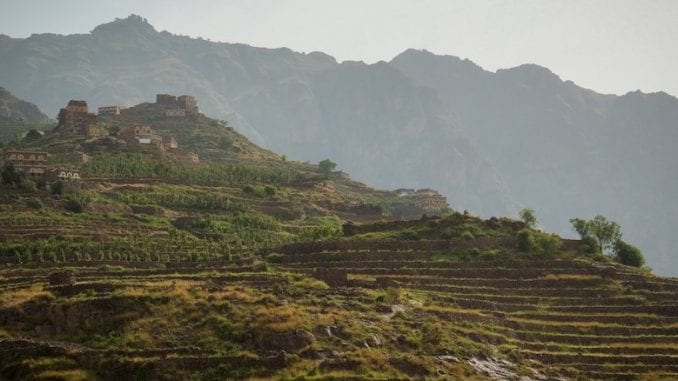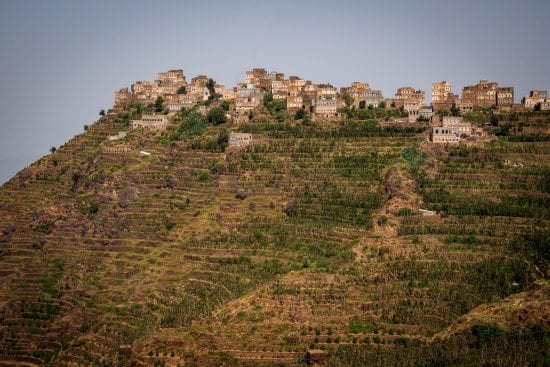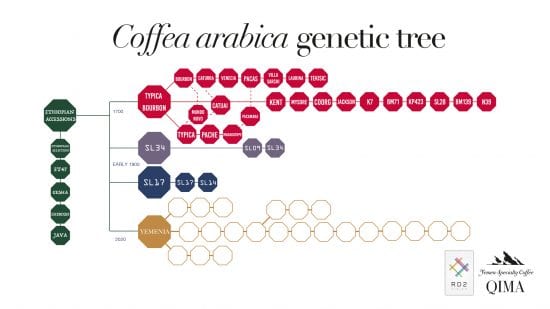
The Qima Yemen Coffee Auction, taking place tomorrow and offering exquisite coffees from the nation, coincides with the discovery of the Yemenia genetic group, which has the potential to impact the greater coffee sector.
BY CHRIS RYAN
BARISTA MAGAZINE ONLINE
Photos courtesy of Qima Coffee
Yemen is one of the most important countries to the history of coffee—most of the coffee consumed around the world in the 16th and 17th centuries was grown in the nation, and many Yemeni farmers have generations of coffee farmers in their past. However, Yemen’s presence in the coffee world faded (read about this history in more detail here), and now the war-torn nation produces only a small amount of coffee.
That said, several upstart coffee organizations are doing their best to cultivate and develop a market for specialty coffee in Yemen. Perhaps most notable is Mokhtar Alkhanshali, founder of Port of Mokha, which roasts high-quality Yemeni coffee, and the subject of Dave Eggers’ novel The Monk of Mokha. Then there’s Faris Sheibani, founder of Yemen’s Qima Coffee, which is using coffee to improve the lives of Yemen’s rural communities.

Faris founded Qima Coffee in 2016, and for the last two years he has partnered with the Alliance for Coffee Excellence (ACE)—the nonprofit organization that runs the global Cup of Excellence competitions—to run the Qima Yemen Coffee Auction, which offers winning coffees from Qima’s coffee-quality competition to the wider coffee community. This year’s auction, taking place September 15, had 1,550 entries, with 45 coffees passing to the International stage, where they were evaluated by one of the largest juries ever organized by ACE—35 judges from 24 companies across 14 countries.
The winning lots represent one of the most interesting and diverse offerings in Yemen’s coffee history, with a comprehensive mix of high scores (five 90+ point scoring lots), genetic and process assortment, and farmer representation. Angelo Benedict Abordo of Cherry Beans Specialty Coffee in Qatar, who served as a judge for the competition, said in an ACE press release, “The coffees were amazing and full of surprises. This has been my best experience so far in tasting Yemeni coffee; explosive character and totally far from what I usually get in my cup of Yemen.”
Faris of Qima Coffee says the goal of the Qima Yemen Coffee Auction is to showcase the country’s coffee potential, and to focus on a different aspect of that potential each year. “This year we chose diversity, and that’s probably what stands out most in this year’s auction offering,” he says. “We sourced the coffees from a very diverse geographic range covering practically all of Yemen’s coffee lands, and we offered a very diverse set of cup profiles. … Besides the obvious economic benefits the farmers get from participating in the auction, there’s also a very important motivation driver in that every farmer in Yemen dreams of making it to the auction and being recognized as the best grower in the country. It’s a very exciting process for all involved.”
While the 20 winning lots’ high quality was cause for celebration, another element added a wrinkle of excitement—and an additional layer of that aforementioned diversity: 15 of the 20 winning coffees represented Yemenia, the recently discovered ancient mother population of Coffea arabica. Qima Coffee announced the discovery of Yemenia this summer, through a partnership with Dr. Christophe Montagnon of RD2 Vision. Yemenia translates in Arabic to “the Yemeni mother”; according to a press release from Qima Coffee, “The discovery represents the most significant finding in arabica coffee since the 1700s and 1900s when the last two major genetic groups of coffee were discovered, i.e., Typica/Bourbon and the SLs respectively.”

Qima Coffee launched the research project, through its R&D program, to investigate and map out Yemen’s genetic coffee landscape. Working with RD@ Vision, Qima conducted what it’s calling the largest genetic survey in Yemen’s history, covering an area of over 25,000km2. Using DNA fingerprinting technology, the study assessed 137 samples of Coffea arabica across three categories: Ethiopian accessions, worldwide cultivated varieties, and a Qima breeding population from Yemen. The research has been submitted for publication in the Genetic Resources and Crop Evolution journal.
Faris says the study yielded a wealth of valuable information, including the finding that Yemen is actually a “mini coffee world” that holds within it all of the cultivated coffee groups of the world—the Typica/Bourbons and the SLs. “That alone is fascinating because it means within this small country, we can find all of the genetics of the world,” Faris says. “From both an agronomic and a market perspective, that finding is very, very interesting.”
The additional discovery of Yemenia, Faris says, is in line with Qima’s mission to ignite a coffee revolution in Yemen to rebuild the nation’s coffee industry. “The discovery of Yemenia is, for me, bringing that revolution to life,” Faris says. “In terms of its impact on Yemen’s coffee future, if we consider the genetic diversity within this single group, the exceptional cup quality it has demonstrated, and the climatic resilience it has displayed in order to survive for hundreds of years in Yemen’s harsh climates, I think we have something that can truly and tangibly change the fate of Yemen’s coffee industry over the coming years and decades. In fact, I think Yemenia will change the world of arabica as we know it.”
At the Alliance for Coffee Excellence, the opportunity to provide a forum through the auction to highlight the discovery of a new arabica mother population is creating excitement. Darrin Daniel, ACE’s executive director, says: “There are so many ways that this discovery may lead to support not only the progression of Yemeni coffee, but quite possibly the rest of the world’s coffee due to issues around climate change and overall genetic diversity outside of Ethiopia and Yemen. Due to the dry climate that Yemen has already faced and still has a vast diversity, climate challenges in other countries may greatly benefit from this discovery in partnership with RD2 Vision and Qima. We await more information and results as Dr. Montagne’s paper will be published in the months to come.”
To find more information and register for the 2nd Qima Yemen Coffee Auction, head here.

